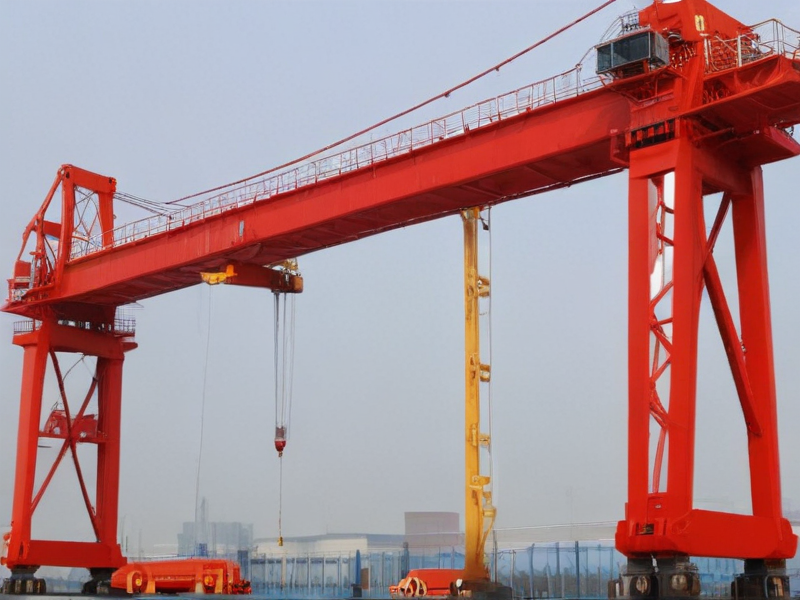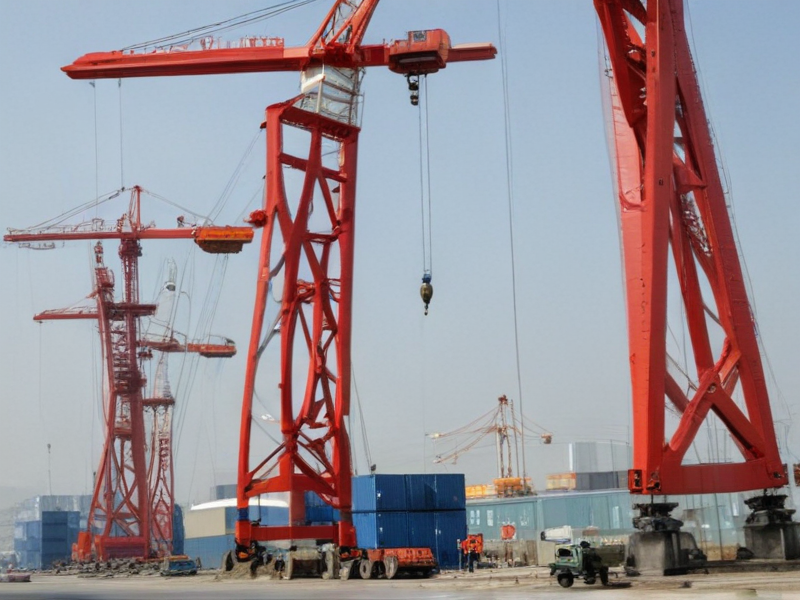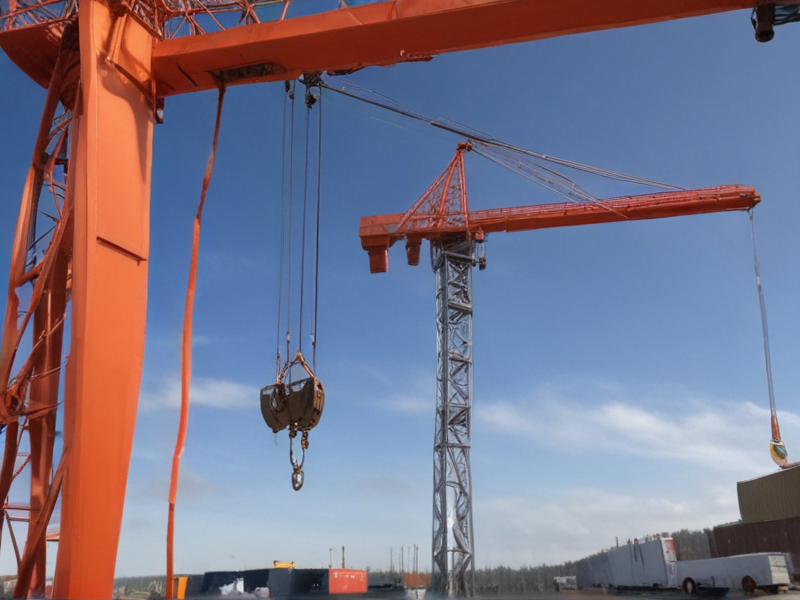Top 10 crane and rigging company in China introduce,list main products and website if have
Certainly! Here is a brief introduction to the top 10 crane and rigging companies in China, along with their main products and websites:
1. XCMG (Xuzhou Construction Machinery Group)
– Main Products: Mobile cranes, all-terrain cranes, tower cranes, truck cranes
– Website: [www.xcmg.com](https://www.xcmg.com)
2. SANY Group
– Main Products: Mobile cranes, crawler cranes, rough terrain cranes, tower cranes
– Website: [www.sanyglobal.com](https://www.sanyglobal.com)
3. Zoomlion Heavy Industry
– Main Products: Mobile cranes, crawler cranes, tower cranes, truck cranes
– Website: [en.zoomlion.com](https://en.zoomlion.com)
4. Liebherr Machinery (Dalian) Co., Ltd.
– Main Products: All-terrain mobile cranes, tower cranes, maritime cranes
– Website: [www.liebherr.com](https://www.liebherr.com)
5. Fushun Yongmao Construction Machinery Co., Ltd.
– Main Products: Tower cranes, construction hoists, and accessories
– Website: [www.ymcm.com](http://www.ymcm.com)
6. Shandong Huaxia Group Co., Ltd.
– Main Products: Tower cranes, construction hoists
– Website: [www.huaxiagroup.com](http://www.huaxiagroup.com)
7. ZHEJIANG KAIHUA MINING MACHINERY CO., LTD.
– Main Products: Tower cranes, Material lifting cranes for mining
– Website: [www.kaihua crane.com](http://www.kaihuacrane.com)
8. Shanghai Pudong Construction Machinery
– Main Products: Tower cranes, construction hoists, concrete pumps
– Website: [details not available]
9. Guangxi Construction Machinery Co., Ltd.
– Main Products: Mobile cranes, tower cranes
– Website: [www.gxcc.com.cn](http://www.gxcc.com.cn)
10. Nantong Ant Machinery Co., Ltd.
– Main Products: Tower cranes, construction hoists, concrete placing booms
– Website: [www.nantong-ant.com](http://www.nantong-ant.com)

How to find and select check reliable crane and rigging company in China
To find and select a reliable crane and rigging company in China, you can follow these steps:
1. Research Online:
– Use search engines, industry forums, and online directories to gather a list of crane and rigging companies in China.
– Check professional platforms like Alibaba, Made-in-China, and Global Sources for company listings and reviews.
2. Verify Credentials:
– Ensure the company has proper licenses and certifications. Look for ISO certifications and membership in relevant industry associations.
– Check their experience in handling projects similar to yours.
3. Read Reviews and Testimonials:
– Look for customer reviews on their website and third-party review sites.
– Reach out to previous clients if possible to gather feedback on their reliability and service quality.
4. Assess Capabilities:
– Review their fleet of cranes and rigging equipment, ensuring they have modern and well-maintained machinery.
– Confirm they have experienced operators and qualified rigging personnel.
5. Safety Standards:
– Inquire about their safety protocols and training programs.
– Ask for their safety records and compliance with local safety regulations.
6. Request Quotes and Compare:
– Contact multiple companies to get detailed quotes.
– Compare prices, but also consider the scope of services included and the company’s reputation.
7. Check Financial Stability:
– Investigate the company’s financial health to ensure they are stable and capable of handling your project without risking delays or stoppages.
8. Visit the Company:
– If feasible, visit their office and some of their project sites to see their operations firsthand.
9. Contract and Terms:
– Review the contract carefully, ensuring all terms, conditions, and project timelines are clearly outlined.
– Look for clauses that address potential delays and how they are managed.
Following these steps will help you choose a reliable crane and rigging company that meets your project needs.
Background Research for crane and rigging company in China, use qcc.com archive.org importyeti.com
Conducting background research on a crane and rigging company in China can be approached through three valuable tools: qcc.com, archive.org, and importyeti.com. Each platform offers unique insights.
qcc.com:
Qcc.com is a leading Chinese corporate database that provides comprehensive details about companies in China. By searching for the desired crane and rigging company on qcc.com, you can access information such as the company’s registration details, business scope, financial status, legal proceedings, and historical administrative penalties. This data can help evaluate the company’s credibility, financial health, and business conduct.
archive.org:
Archive.org, also known as the Wayback Machine, is an internet archive that allows you to view historical snapshots of websites. Using this tool, you can track the website changes and online presence of the crane and rigging company over the years. This can provide insights into the company’s growth, branding evolution, and any significant announcements or changes in services. Key historical changes may indicate strategic shifts or resilience in the market.
importyeti.com:
Importyeti.com is a platform that analyzes import data and provides insights into a company’s supply chain and trade activities. By searching for the crane and rigging company, you can access details on their import records, the origins of their cranes and rigging equipment, and the frequency of their transactions. This data is crucial for understanding the company’s reliability in terms of supply chain management, their international trade partners, and their import volume.
Conclusion:
These platforms collectively provide a thorough background check on the crane and rigging company. Qcc.com offers legal and financial insights, Archive.org provides historical web presence and branding data, while Importyeti.com reveals crucial supply chain and trade information. Together, these resources aid in a well-rounded analysis of the company’s credibility and operational integrity.

Price Cost Research for crane and rigging company in China, use temu.com and 1688.com
Conducting price cost research for a crane and rigging company in China using temu.com and 1688.com can provide valuable insights into the cost dynamics of this industry. Here is a summarized overview:
Temu.com
Temu.com is a marketplace that may offer various crane and rigging equipment. You can find products such as:
1. Cranes: Prices for mobile cranes can range from USD 20,000 to USD 100,000 depending on specifications, lifting capacity, and brand.
2. Rigging Equipment: Standard rigging tools like shackles, slings, and hooks vary between USD 5 to USD 200 per unit depending on quality and size.
3. Accessories: Accessories like rigging hardware and load binders range from USD 10 to USD 500.
1688.com
1688.com primarily serves as a B2B platform within China, providing bulk buying options which could offer lower prices per unit.
1. Cranes: Prices for mid-sized cranes (30 tons lift capacity) generally range from CNY 150,000 to CNY 700,000 (approximately USD 20,000 to USD 100,000).
2. Rigging Equipment: A bulk order of rigging tools sees prices between CNY 30 to CNY 1,500 (approximately USD 4 to USD 200).
3. Accessories: High-quality rigging accessories range from CNY 50 to CNY 3,500 (approximately USD 7 to USD 500).
Conclusion
While both websites provide competitive pricing, 1688.com usually offers better rates for bulk purchases due to its B2B nature. For specific and unique products, Temu.com might occasionally offer more competitive terms due to its varied stock. Additional costs such as shipping, customs, and logistics should be considered when calculating the overall investment. Always ensure products meet the required safety and certification standards for operations.
Compare China and Other crane and rigging company: Products Quality and Price,Visible and Hidden Costs
When comparing the crane and rigging offerings of Chinese companies to those from other regions, several factors merit attention, chiefly product quality, price, and costs, both visible and hidden.
Product Quality and Price:
Chinese crane and rigging firms generally offer competitively priced equipment. These cost advantages can often be attributed to lower labor costs and government subsidies in China. However, the quality of Chinese products can vary significantly. While some firms produce equipment that meets international standards, others may fall short on durability and precision. In contrast, companies from regions like Europe and the U.S. are often lauded for higher quality, with stringent adherence to safety and performance standards. This usually results in a higher price tag but promises better longevity and reliability.
Visible and Hidden Costs:
Visible costs include the upfront price of the crane or rigging equipment. Here, Chinese products usually have the upper hand with lower initial costs. However, hidden costs, such as maintenance, repairs, and potential downtime, can accumulate over time. Equipment from established Western brands may have higher initial prices but often benefits from lower hidden costs due to better reliability and comprehensive customer support.
Chinese products may also come with shorter warranties and less robust service networks outside China, leading to higher long-term costs. Import tariffs, shipping fees, and longer lead times for spare parts are critical hidden costs to consider when purchasing from China. On the other hand, Western products, although pricey initially, might offer better overall value due to longer warranties, reliable availability of parts, and stronger customer service networks.
In summary, Chinese crane and rigging companies often win on price but may incur higher hidden costs and variable quality. Conversely, Western companies generally provide higher-quality equipment with fewer hidden costs, albeit at a higher initial price.
Custom Private Labeling and Branding Opportunities with Chinese crane and rigging company
Collaborating with a Chinese crane and rigging company offers lucrative opportunities for custom private labeling and branding. Leveraging China’s advanced manufacturing capabilities and cost advantages, businesses can deliver high-quality, competitively priced products under their brand. Here’s how you can capitalize on this:
1. Product Customization: Partner with manufacturers to design cranes and rigging equipment that meet specific market needs. Utilize customizable features—materials, load capacities, and technological integrations—to differentiate your brand.
2. Brand Identity and Packaging: Develop unique branding elements such as logos, color schemes, and packaging designs. This not only enhances brand recognition but also adds value to your products.
3. Quality Assurance: Ensure consistent product quality through stringent quality control processes. Establish clear standards and perform regular inspections to maintain brand reputation.
4. Innovation and Technology: Incorporate cutting-edge technology in products, like remote operation features, automated control systems, and IoT integrations. Partnering with tech-savvy manufacturers can set your brand apart.
5. Marketing and Distribution: Utilize efficient supply chains and marketing strategies to introduce your branded products to global markets swiftly. Highlight your brand’s unique selling points, like affordability, innovation, and reliability.
6. Regulatory Compliance: Ensure all products meet international safety and quality standards. This builds brand trust and opens doors to various markets.
7. Collaborative Development: Work closely with manufacturers to stay ahead of industry trends, adapting and evolving your product line in response to market demands.
In summary, capitalizing on private labeling and branding with a Chinese crane and rigging company allows for customized, high-quality products that strengthen your market presence and appeal to targeted customer bases.
Tips for Procurement and Considerations when Purchasing from crane and rigging company
When procuring products or services from a crane and rigging company, several key considerations can ensure you make the best choice:
1. Supplier Evaluation: Investigate the company’s reputation, experience, and certifications. Look for certifications like ISO 9001, OSHA compliance, and membership in relevant industry associations.
2. Project Requirements: Clearly define your project needs, including load capacities, heights, reach, and specific rigging requirements. This will help you identify a supplier who can meet these specifications.
3. Equipment Quality: Inspect the condition of cranes and rigging equipment. Verify maintenance records to ensure machinery is well-maintained and reliable.
4. Safety Standards: Prioritize companies that adhere to stringent safety protocols. Check for comprehensive safety plans and training programs for their personnel.
5. Insurance: Confirm that the company has adequate insurance coverage, including liability insurance, to protect against potential damages or accidents.
6. Compliance: Ensure they comply with local, state, and federal regulations regarding crane and rigging operations.
7. Pricing and Quotes: Obtain detailed quotes, including all potential costs—equipment rental, operator fees, transportation, and overtime.
8. Experience and Expertise: Assess the technical expertise and experience of the company’s operators and riggers. Experienced professionals can handle complex lifts safely and efficiently.
9. References and Reviews: Ask for references from past clients and read online reviews to gauge customer satisfaction and reliability.
10. Availability and Scheduling: Ensure the company’s availability aligns with your project timeline. Confirm their ability to respond to any unforeseen schedule changes.
By paying close attention to these aspects, you can select a crane and rigging company that offers dependable service, prioritizes safety, and delivers on your project requirements efficiently.

FAQs on Sourcing and Manufacturing from crane and rigging company in China
FAQs on Sourcing and Manufacturing from Crane and Rigging Companies in China
1. Why should we consider sourcing from China?
China offers cost-effective solutions, high production capacity, and an extensive range of suppliers with experience in manufacturing crane and rigging equipment to international standards.
2. How can we ensure the quality of products?
Conduct thorough due diligence by researching potential suppliers, requesting product samples, inspecting factories, and hiring third-party quality control inspectors.
3. What certifications should our suppliers have?
Ensure your suppliers have relevant certifications like ISO 9001 for quality management, CE for safety compliance in Europe, and ASME for manufacturing standards.
4. How do we verify a supplier’s credibility?
Check their business license, industry certifications, financial records, and customer testimonials. Platforms like Alibaba and Global Sources provide supplier ratings and reviews.
5. What are the payment terms typically offered?
Common payment terms include 30% upfront and 70% before shipment. Letters of Credit (LC) and Trade Assurance services on platforms like Alibaba offer additional security.
6. What is the usual lead time for manufacturing?
Lead times vary but typically range from 30 to 60 days, depending on the complexity and volume of the order.
7. How do we handle shipping and logistics?
Partner with reputable freight forwarders for efficient logistics management. They will assist in customs clearance, shipping documentation, and door-to-door delivery.
8. Are there any risks involved in sourcing from China?
Risks include potential communication barriers, quality inconsistencies, and intellectual property concerns. Mitigate these risks with clear contracts, regular quality inspections, and legal protections.
9. Can we customize products according to our specifications?
Most Chinese suppliers offer customization services. Provide detailed specifications, designs, or samples to ensure the final product meets your requirements.
10. What should be included in a sourcing contract?
Your contract should outline product specifications, payment terms, confidentiality agreements, quality standards, delivery schedules, and dispute resolution mechanisms.
By addressing these frequently asked questions, companies can make informed decisions when sourcing and manufacturing from crane and rigging companies in China.

